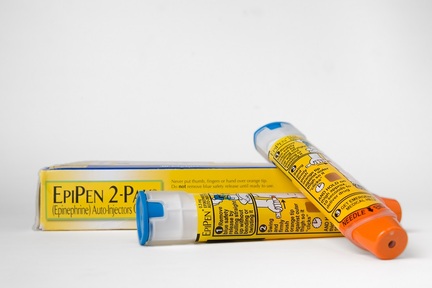Health and social care minister criticises makers of EpiPen in continued supply fiasco
Matt Hancock, the Secretary of State for Health and Social Care has criticised the US makers of EpiPen adrenaline auto-injectors, complaining of a ‘lack of clear information being supplied by the company [Mylan] on the resolution timescales’.

The comments were in response to a letter addressed to him on 4 October by MP Dr Sarah Wollaston, chair of the Health Select Committee, about the recent lack of supply of EpiPens for people with life-threatening allergies.
Situation should improve 'middle to the end of October'
Mr Hancock also gave a clear indication of when stocks should be back to their normal levels, by saying: “I understand that the situation should start to improve from the middle to the end of October, though full resolution is not expected until the end of the year.”
He relayed in his letter that the DHSC was first alerted by Mylan there were issues with EpiPen supplies this March.
These 'issues' had arisen because there were manufacture delays by Mylan's sole contract manufacturers, a subsidiary of Pfizer, that makes all of their EpiPens. This was due to adverse FDA inspections.
Parents, care workers and healthcare professionals are increasingly worried about low stocks of EpiPens, and how to keep vulnerable people with allergies safe. Junior EpiPen stocks have run out completely.
Vulnerable groups of people such as children and the elderly, are more likely to need a reactive response rather than a solely preventative approach to allergy management, and the MRHA (Medicines and Healthcare products Regulatory Agency) has already had to issue a Supply Disruption Alert in September of this year to manage the remaining stocks.
The DHSC 'now has greater insight' into stock delays
Mr Hancock states in his letter: “The Department’s chief commercial officer has been in close contact with Mylan and Pfizer executives within both their UK and global teams to reiterate the seriousness of the situation, our concerns about the short notice of a problem, the lack of clear information being supplied by the company on the resolution timescales and to seek commitment from the company to expediate deliveries to the UK.
“We now have much greater insight into the nature of the root causes of these issues and the companies are providing regular updates. Through these contacts, Mylan have agreed to divert additional stock to the UK in the coming months.”
He agreed for labelling regulations to be relaxed to cut delivery times by another three weeks and also indicated the government will be keeping up the pressure to make sure the next deliveries due in November and December arrive on time.
The Supply Disruption Alert mentioned was issued on September 28 2018 and is valid until 31 December 2018. It provides guidelines for healthcare professionals on managing existing supplies.
Adrenaline-auto injectors should only be prescribed 'to those who absolutely need them'
The headline information is that adult and child adrenaline-auto injectors are only prescribed and dispensed to those who absolutely need them.
The alert also advised:
• Users should not dispose of their expired devices until they have replaced them.
• Junior adrenaline auto-injectors (150mcg) must only be dispensed to children under 30kg, in line with the existing established guidance. Other children weighing more than 30kg need to be given adult auto-injectors (300mcg).
• Adrenaline auto-injectors expire on the last day of the month indicated – For example, a device labelled ‘April 2019’ does not expire until the end of April 2019.
• The MHRA have extended the use of certain adult EpiPens by four months.
• Some adults and children may need to switch from their usual device to alternative adrenaline auto-inject devices The different brands of adrenaline auto-injectors are not used in exactly the same way and specific training and advice is required.
Latest News
 29-Jul-24
Dementia Bus gives carehome.co.uk staff insight into life with dementia
29-Jul-24
Dementia Bus gives carehome.co.uk staff insight into life with dementia
 01-Mar-24
Find out the top care homes in 2024
01-Mar-24
Find out the top care homes in 2024
 21-Mar-23
UK's top care homes in 2023 revealed
21-Mar-23
UK's top care homes in 2023 revealed
 03-Jan-23
carehome.co.uk launches free care helpline
03-Jan-23
carehome.co.uk launches free care helpline
 13-Dec-22
5 mins with Emily Whitehurst, chief operating officer for Constantia Healthcare
13-Dec-22
5 mins with Emily Whitehurst, chief operating officer for Constantia Healthcare